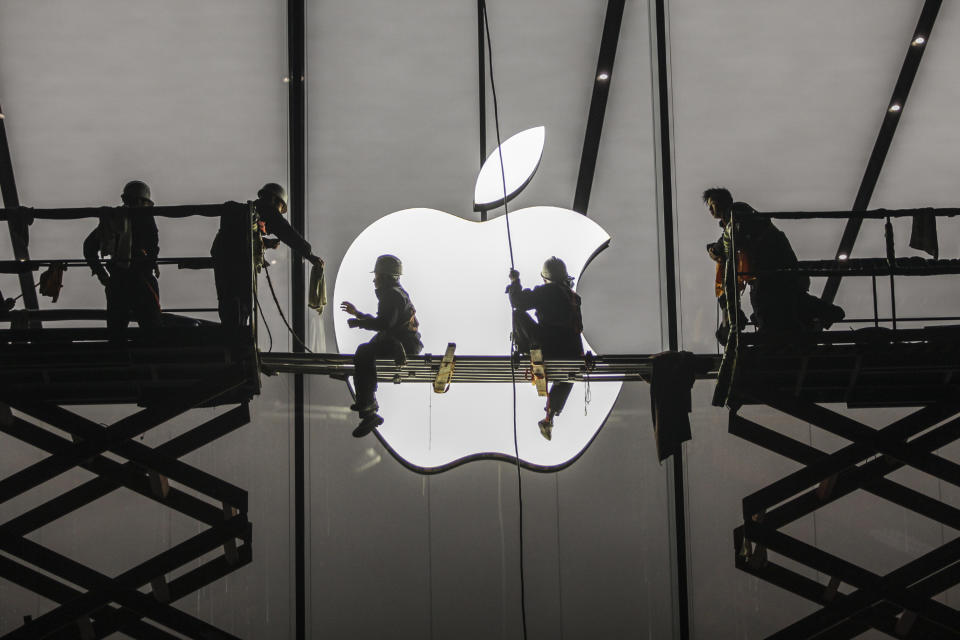How Apple can hit a $1 trillion market cap

For investors seeking a piece of Apple (AAPL), there’s still significant upside to be had, suggests a new report from RBC Capital Markets out on Monday.
RBC Capital Markets analyst Amit Daryanani writes that the Cupertino, Calif.-based tech giant could see its market cap hit — or even surpass — $1 trillion within the next 12-18 months. Apple currently has a market cap of $802.9 billion.
“We believe AAPL’s current stock price creates an attractive entry point for investors to benefit from its ability to return to revenue and EPS growth in FY17,” writes Daryanani, who reiterated the investment bank’s “Outperform” rating and raised his price target to $168 per share, up 11% from $153 per share from last week.
The RBC Capital Markets analyst’s decidedly bullish scenario assumes mid-single-digit revenues growth for Apple, driven largely by the launch of the highly anticipated iPhone 8 this fall. Apple’s flagship device, rumored to sport an all-new design and features like a larger screen and wireless charging, is expected to sell at a higher “premium” retail price. He also expects the iPhone 8 to see sales comparable to previous iPhones or modestly higher sales.
However, Apple needs to reach several milestones before it can achieve a $1 trillion market cap, Daryanani explains. Those milestones include Apple expanding its gross margins and operating margins by 20-30 basis points and nearly 100 basis points, respectively. That could be achieved, in part, through further growing its share in the smartphone and tablet markets.
“In our view, the smartphone space is currently a two-horse race where Apple will be one of the winners in continuing to gain market share,” he adds.
And while the iPhone 8 will be one of the largest drivers of revenues later this year, Daryanani points to Apple’s ubiquitous iOS ecosystem as actually being the company’s biggest strength.
“iOS provides users with an integrated, scalable, and seamless experience across multiple devices, which we believe will be difficult for competitors to replicate in scale,” he explains. “Simplistically, the scale of users attracts application developers, which in turn bolsters the number of users. We believe this cycle results in a captive consumer base that transitions more data and usage via iOS on Apple devices.”
Daryanani’s report follows several weeks after Apple reported its second-quarter 2017 earnings, in which the company reported selling 50.76 million iPhones. While that figure missed Wall Street analysts’ estimates of 52 million units, Apple actually earned more off every smartphone it sold. And CEO Tim Cook chalked up the slight miss to the impending arrival of the iPhone 8.
“We’re seeing what we believe to be a pause in purchases of iPhones, which we believe are due to the earlier and much more frequent reports about future iPhones,” Cook told analysts on the second-quarter 2017 earnings call. “That part is clearly going on and what’s going on behind the data.”
—
JP Mangalindan is a senior correspondent for Yahoo Finance covering the intersection of tech and business. Follow him on Twitter or Facebook.
More from JP:
Why Amazon let 4,000 dogs into its Seattle headquarters
Apple might buy a big company but not the ones you think
Here’s how much Nvidia will make off the Nintendo Switch
Microsoft exec: Why I’m not worried about robots taking people’s jobs
LEAKED PHOTOS: Fitbit’s new headphones and troubled smartwatch
Why it doesn’t matter that Amazon’s most popular service costs it billions
RBC: ‘Amazon has a potential mega-hit on its hands’

 Yahoo Finance
Yahoo Finance 
